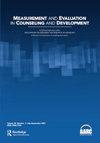来自农村和西班牙裔社区PHQ-4分数测量不变性和心理测量信度的证据
IF 2.2
4区 心理学
Q2 Psychology
Measurement and Evaluation in Counseling and Development
Pub Date : 2021-04-21
DOI:10.1080/07481756.2021.1906157
引用次数: 6
摘要
摘要采用以西班牙裔为主的农村样本(N = 711)。研究结果支持在性别、年龄组和西班牙语群体中使用单因素模型。讨论了咨询实践和研究意义。本文章由计算机程序翻译,如有差异,请以英文原文为准。
Evidence for Measurement Invariance and Psychometric Reliability for Scores on the PHQ-4 From a Rural and Predominately Hispanic Community
Abstract The factor structure, measurement invariance, and internal consistency of the Patient Health Questionnaire for Depression and Anxiety (PHQ-4) was examined with a rural, predominately Hispanic sample (N = 711). Findings supported use of a one-factor model across gender, age groups, and Spanish-speaking groups. Counseling practice and research implications are discussed.
求助全文
通过发布文献求助,成功后即可免费获取论文全文。
去求助
来源期刊
CiteScore
2.40
自引率
10.00%
发文量
21
期刊介绍:
Measurement and Evaluation in Counseling and Development is an official journal of the Association of Assessment and Research in Counseling (AARC), a member association and division of the American Counseling Association. Articles range in appeal from those that deal with theoretical and other problems of the measurement specialist to those directed to the administrator, the counselor, or the personnel worker--in schools and colleges, public and private agencies, business, industry, and government. All articles clearly describe implications for the counseling field and for practitioners, educators, administrators, researchers, or students in assessment, measurement, and evaluation.

 求助内容:
求助内容: 应助结果提醒方式:
应助结果提醒方式:


